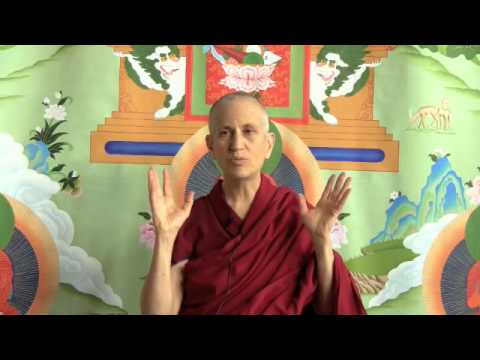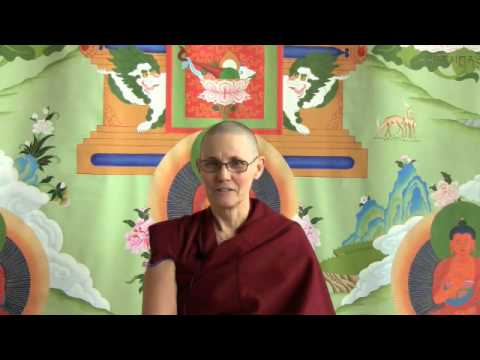Unrealistic fear
Part of a series of Bodhisattva's Breakfast Corner talks given during the Green Tara Winter Retreat from December 2009 to March 2010.
- Keeping an open, broad mind in the face of a fearful situation
- We can only work with the situation we’re in
- As long as we’re alive we have a mind that can practice the Dharma
Green Tara Retreat 035: Unrealistic fear (download)
Part 1
Part 2
I’m going to talk about when those big things happen and how the mind tends to go into fear and panic mode. I was thinking about 9/11. Within a few days after 9/11 I was on an airplane. That’s what you do when you teach the Dharma. I went somewhere to teach. The teaching engagement had already been arranged. I remember taking a walk in the neighborhood. Since it was only a couple of days afterwards I was feeling like this whole thing could fall apart. Do you remember those few days afterwards? It was like everybody thought the whole country was going to disintegrate and we’d all wind up back in the Stone Age. This is an excellent example of how our minds collectively went into panicked, unrealistic fear, isn’t it? I mean just worst-case scenario. So I remember taking a walk and thinking, “Well, what do I do?” I just don’t want to live my life overrun by fear, because that is not a life. And so I thought, “Well, I can’t control the whole thing because it’s bigger than I am. It depends on the karma of a lot of living beings, not just my own karma. So whatever comes I have to be open-minded and broadminded and make it a part of my fuel for practice.”
Whatever comes, this is the situation that I practice in—because there’s nothing else to do but practice. There’s no other situation to practice in besides the one you’re in, right? So, there’s nothing else to do but that. Worry and panic and freak-out have no place if you think about the situation in a realistic way. And so, that’s what we do. If there are things that we can do to prepare for a bad situation that might come, then we do that preparation. For example, we take care of our health, and so on and so forth, in order not to get sick. We do what we can to contribute to world peace, knowing that we can’t control everything. But then, whatever situation that we’re in, that’s the one we practice in. And since that is what is, then there’s nothing else to say or do, is there?
So drop the fear and the anxiety and all of that stuff. We all have bodies. We all know that we’re either going to get very ill, injured in an accident, or we’re going to die of natural causes. Those are the three options. Once you’re born in samsara, those are the three options. So what do we do now? We try and prepare our mind so that if we’re old and sick, or old and in pain or disabled, or whatever it is—that at least we can have a mind that still contemplates bodhicitta, a mind that can create merit, and can purify. We can at least try and be happy and kind to the people who are around us up until the time that we leave this body. Then leave this body with aspirations to continue our bodhicitta practice.
That’s the reality of our situation, isn’t it? So let’s get on with it. There’s nothing to worry about. We know what’s coming, so we prepare our mind as best as we can. If we do that, there’s no fear, there are no regrets. And maybe we can even be like some of the great practitioners who see death as so much fun that it’s like going on a picnic. Really, I’ve seen people die like that. Then you continue your bodhisattva practice to keep benefiting sentient beings. So there we are.
There’s nothing else, is there? We know what’s coming, so there’s no sense fearing it. We just prepare.
Audience: Venerable, I’m wondering about catastrophic situations that come up really fast, when you weren’t in the tower in the stairwell. What other kinds of practices will prepare us for these extreme situations, such as someone pointing a gun at your head in an airplane?
Venerable Thubten Chodron (VTC): Dallas has a really creative imagination right now and somebody’s going to be pointing a gun at our heads in an airplane. That one hasn’t happened yet. I don’t know, maybe it happened back in the 70’s. I’m not sure about the hijackings then. But anyway, that one doesn’t happen too often. Our being in the stairwell of the Twin Towers doesn’t happen too often either, does it? Now certainly these very urgent, catastrophic things happen. Like, you’re in the earthquake in Haiti. I remember being in a big earthquake in Los Angeles, and it was just like you said. I felt the earth shaking. I got under the desk. That was my instinct. That’s what we were told as children to do when the Communists come get you. So, that’s what I did until I figured out it was an earthquake. If you’re in an urgent, catastrophic situation, then I think the best thing to do (as much as we can) is to try and keep a cool, level head and to help the people around us and ourselves to the best of our ability. Is screaming and getting hysterical going to help? That actually harms other sentient beings. When one person starts to scream and get hysterical, then everybody goes that way. Then nobody is thinking clearly and nobody can deal with the situation. I don’t know if I’ll be able to remain calm the next time I’m in that situation. But, do your best and say, “This is a situation. Clearly, my previous karma’s at work here. I created the cause to be in this situation; it’s a karmic ripening.” So as best as you can, cultivate bodhicitta and be of benefit; have some awareness of emptiness at that time. Do that. If you get hysterical and scream, then try and calm yourself down. Is there anything else to do?
Audience: Take refuge.
VTC: Yes, take refuge. Take refuge.
It’s the same thing if you have nightmares or if somebody is swearing at you, or with all these small things in our lives that we are so touchy and freak out about. These are all the practice periods that will help us train, so that when the big things come we’re well prepared. They’re like our driver’s education class. So when we have problems in our lives, we should say, “This is part of my bodhisattva training. If I’m going to practice as a bodhisattva, I’m going to have to face situations far worse than this. So this is part of my training.” And then we do the best we can. It’s the same as you’re doing on your cushion. When your mind goes off, try and bring it back to what’s important and what’s essential: so refuge, bodhicitta, wisdom.
Venerable Thubten Chodron
Venerable Chodron emphasizes the practical application of Buddha’s teachings in our daily lives and is especially skilled at explaining them in ways easily understood and practiced by Westerners. She is well known for her warm, humorous, and lucid teachings. She was ordained as a Buddhist nun in 1977 by Kyabje Ling Rinpoche in Dharamsala, India, and in 1986 she received bhikshuni (full) ordination in Taiwan. Read her full bio.


